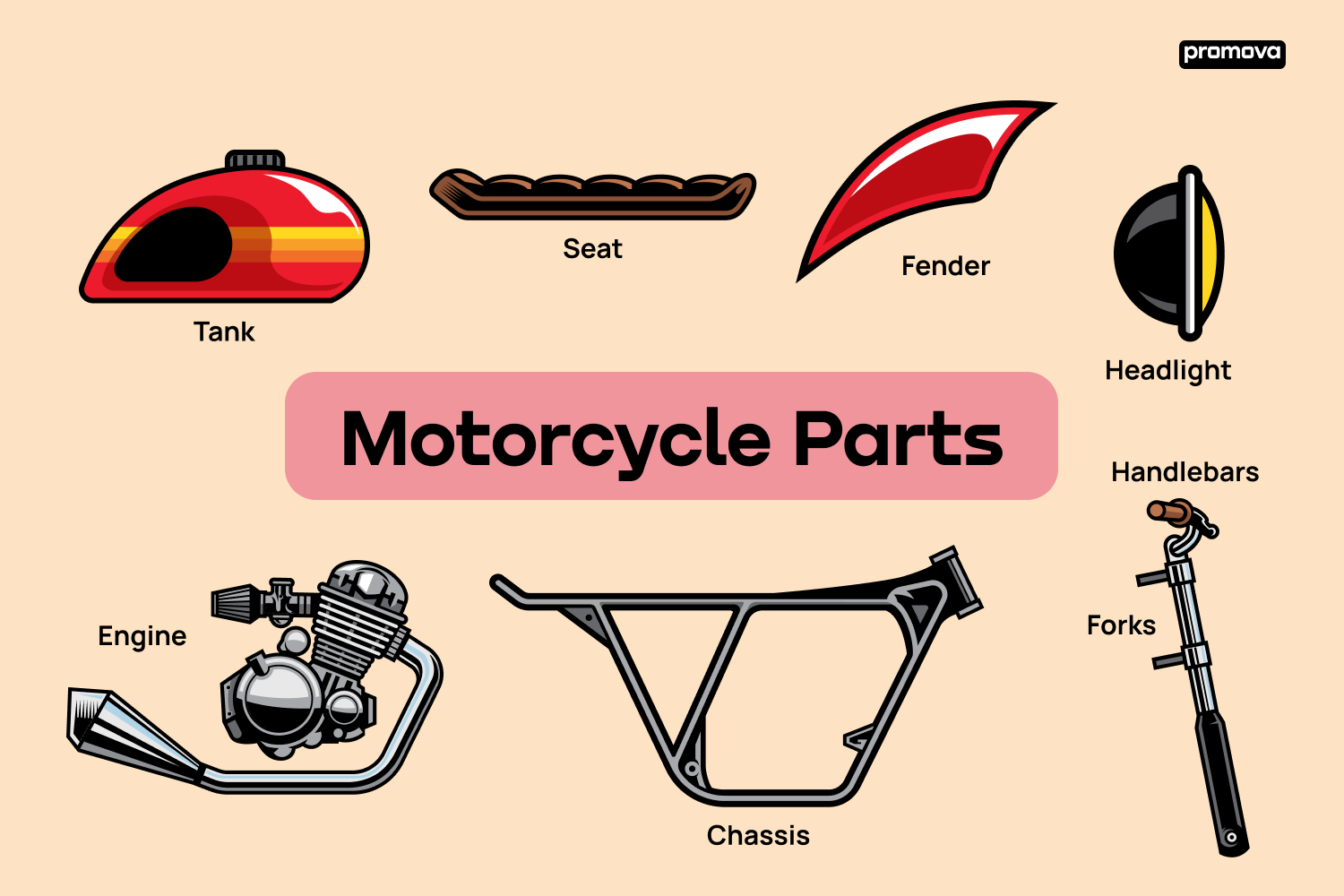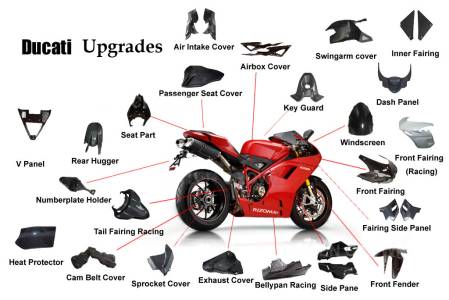Is It Worth Investing In OEM-Spec OEM Parts New Zealand?
Is It Worth Investing In OEM-Spec OEM Parts New Zealand?
Blog Article
Discover the Crucial MotorBike Components You Need for Ideal Efficiency
Understanding the necessary parts of a motorcycle is basic for achieving peak efficiency. Each part, from the engine to the stopping system, plays a vital role in overall capability and security. Routine upkeep can protect against unanticipated failings and boost the riding experience. Nonetheless, many bikers neglect the ins and outs of these systems. Uncovering exactly how they function with each other can cause a more reliable trip. What critical parts should every motorcyclist focus on?
The Engine: The Heart of Your Motorcycle
The engine functions as the core part of a bike, driving its efficiency and specifying its capacities. It is in charge of converting fuel into power, which powers the bike onward. Different sorts of engines are used, consisting of single-cylinder, V-twin, and inline setups, each offering distinctive features fit for various riding objectives and styles. The engine size, commonly gauged in cubic centimeters (cc), considerably influences efficiency, with larger engines normally providing more power and torque.Furthermore, the engine's layout and modern technology, such as gas injection systems or air-cooling versus liquid-cooling, affect effectiveness and dependability. Maintenance is essential for peak operation; variables like normal oil changes and monitoring ignition system assurance durability. Riders typically think about an engine's responsiveness and level of smoothness, as these features enhance the overall riding experience. Ultimately, the engine remains an essential element that specifies not only the bike's performance however likewise the motorcyclist's connection to the equipment.
The Transmission: Shifting Gears Smoothly
The transmission plays an essential duty in a motorbike's performance, especially in the auto mechanics of equipment moving. Understanding exactly how to shift equipments smoothly can improve the general riding experience, while routine upkeep guarantees peak capability. Proper interest to these elements can considerably influence the long life and performance of the motorcycle.

Gear Shifting Mechanics
Smooth gear shifting is essential for perfect motorcycle efficiency, greatly impacting both velocity and control. The auto mechanics of gear shifting entail the communication in between the clutch, gear bar, and transmission system. When a motorcyclist engages the clutch, it disengages the engine from the transmission, permitting a gear change without harming the elements. A well-timed launch of the clutch, incorporated with exact movement of the gear bar, assists in a seamless adjustment between gears. This process guarantees that the engine operates within its ideal power band, improving performance. Bike Parts Wellington. In addition, understanding the gear proportions and their impact on rate and torque can aid riders make informed selections throughout shifts, ultimately adding to an extra enjoyable and receptive riding experience
Maintenance Tips Importance
Routine upkeep plays a necessary duty in assuring that the transmission system operates efficiently, enabling for smooth gear shifts. Routinely altering the transmission and checking fluid is crucial, as old fluid can bring about boosted rubbing and wear. In addition, evaluating the clutch for wear warranties peak involvement and disengagement, avoiding slippage during gear changes. Lubrication of moving components is just as vital to reduce friction and improve efficiency. Motorcycle owners ought to also keep track of for leaks and uncommon noises, as these can suggest underlying issues. By adhering to these upkeep ideas, cyclists can extend the life-span of their transmission system, assuring that equipment changes stay smooth and contributing to the overall performance of their motorcycle.
The Braking System: Ensuring Safety And Security on Every Ride
Braking systems are fundamental parts that straight influence a motorcycle's safety and security and efficiency. They contain numerous parts, including brake pads, blades, calipers, and hydraulic lines, all interacting to ensure efficient slowdown. The kind of braking system-- normally either disc or drum-- influences responsiveness and quiting power.Regular upkeep is important to support peak performance; worn brake pads can bring about reduced efficiency and boosted stopping ranges. In addition, the high quality of brake liquid need to be kept an eye on, as it can absorb moisture gradually, endangering braking efficiency.Riders must likewise take into consideration the value of anti-lock stopping systems (ABS), which avoid wheel lockup throughout abrupt quits, improving general security. Correctly working brakes are not simply about quiting; they infuse self-confidence in the motorcyclist, enabling more secure navigating through different surfaces. Ultimately, a dependable stopping system is critical for delighting in every ride with tranquility of mind.
The Suspension: Enhancing Convenience and Control
A well-functioning suspension system significantly adds to a motorbike's total performance, matching the effectiveness of the braking system. The suspension plays a substantial duty in taking in shocks from irregular surface areas, ensuring a smoother adventure while maintaining tire contact with the road. This contact is important for both stability and control, allowing bikers to navigate corners with confidence and precision.Different kinds of shock absorber, such as telescopic forks or mono-shocks, use differing degrees of convenience and handling. Properly tuned suspension improves responsiveness, supplying the cyclist with a much more linked feel to the motorbike. Regular upkeep checks are crucial to ascertain the suspension parts, consisting of springs and dampers, are functioning at their finest. A reliable suspension system not just elevates the riding experience however additionally adds to the durability of various other motorcycle parts by decreasing deterioration. As a result, purchasing quality suspension is important for any major motorbike enthusiast.
The Tires: Linking You to the Road
Tires play an essential duty in a motorbike's efficiency, acting as the main link between the rider and the roadway. Recognizing the different types of tires available can significantly impact managing and security. Furthermore, regular upkeep is essential to guarantee peak tire performance and longevity.
Tire Types Explained
How do various tire kinds affect a motorbike's performance? Tire types play a vital function in establishing a motorbike's stability, grip, and handling. Sporting activity tires, created for high performance, deal improved grip my link and responsiveness on paved roadways, making them excellent for racing and aggressive riding. Conversely, exploring tires focus on longevity and comfort, providing a smoother ride for long-distance traveling. Off-road tires, characterized by their tough tread patterns, master grip on unpaved surfaces, suitable for journey lovers. Additionally, dual-sport tires mix attributes from both on-road and off-road classifications, dealing with flexible riding demands. Inevitably, selecting the right tire kind is necessary for enhancing efficiency, guaranteeing safety, you can find out more and boosting the overall riding experience.
Maintenance Tips Offered
While riding on the road, maintaining optimal tire condition is essential for safety and security and efficiency. On a regular basis examining tire pressure is necessary, as under-inflated tires can lead to poor handling and boosted wear. It is recommended to evaluate walk deepness regularly; used tires concession hold and security. On top of that, riders must look for indications of damages, such as bulges or fractures, which can indicate the requirement for replacement. Turning tires regularly guarantees even put on, improving durability. Keeping tires tidy from particles and staying clear of too much curbs can prolong their life-span. Lastly, preserving appropriate positioning and equilibrium contributes to peak performance, minimizing stress on various other bike components. Sticking to these maintenance suggestions will considerably enhance the general riding experience.
The Gas System: Sustaining Efficiency and Performance
The fuel system plays an essential function in making best use of a motorcycle's efficiency and efficiency, as it ensures the ideal shipment of gas to the engine. It makes up several important elements, including the fuel container, fuel pump, fuel filter, and gas injectors or carburetor. Each part needs to function properly to guarantee a smooth and effective ride.The fuel storage tank stores gas and provides it to the engine via the gas pump, which generates the required stress. A gas filter stops pollutants from going into the engine, while the injectors or carburetor mix gas with air for combustion.Proper upkeep of the fuel system is important; a clogged filter or malfunctioning injector can cause decreased performance and enhanced fuel usage. By verifying that the fuel system runs effectively, bikers can appreciate better throttle action, far better fuel economic climate, and on the whole enhanced riding experience.
The Electric System: Powering Your Adventure
A reliable electrical system is essential for the overall functionality and security of a motorbike, as it powers critical elements such as the ignition, lights, and numerous electronic systems. This system consists of the battery, which stores energy, and the alternator, in charge of creating power while the engine runs. The wiring harness links these parts, making sure dependable power distribution.Additionally, fuses safeguard the system from overloads, while relays assist regulate high-current gadgets with low-power signals. A well-kept basics electric system boosts efficiency by making sure smooth beginnings and consistent operation of lights and signals, crucial for motorcyclist presence and safety.Regular checks of the battery's fee and connections are important for preventing electric failings. Bikers ought to additionally evaluate circuitry for wear and tear, ensuring all parts function preferably. Eventually, a robust electrical system adds considerably to the general efficiency and dependability of the motorcycle.
Frequently Asked Inquiries
How Typically Should I Replace My Motorbike's Battery?
The frequency of bike battery replacement depends on usage and maintenance (Bike Parts Wellington). Normally, batteries need to be replaced every 3 to five years. Routine checks can aid identify when a replacement is needed for peak efficiency
What Devices Do I Need for Fundamental Bike Upkeep?
For standard bike maintenance, one calls for necessary devices such as an outlet set, wrenches, screwdrivers, pliers, tire stress scale, and a torque wrench. These devices facilitate reliable maintenance and assure the motorcycle runs effectively and securely.
Exactly How Can I Improve My Motorcycle's Aerodynamics?
To boost motorbike the rules of aerodynamics, one should think about adjusting fairings, utilizing windshield expansions, enhancing body position, and decreasing overall weight. These alterations help minimize drag, boosting security and gas efficiency during trips.
What Are the Signs of a Failing Electrical System?
Indications of a failing electrical system include lowering lights, difficulty starting, uneven tool analyses, and blown merges. Bike Parts Wellington. Uncommon scents or rust around battery terminals might additionally suggest underlying concerns requiring prompt focus for safety and performance

Just how Do I Pick the Right Oil for My Motorcycle?
When picking oil for a motorbike, one need to take into consideration the producer's requirements, viscosity scores, and the kind of riding. Additionally, synthetic versus traditional oil can affect efficiency and engine security, affecting the choice greatly. The engine dimension, typically determined in cubic centimeters (cc), significantly influences efficiency, with larger engines typically giving even more power and torque.Furthermore, the engine's layout and technology, such as fuel shot systems or air-cooling versus liquid-cooling, affect effectiveness and dependability. A well-functioning suspension system considerably adds to a motorcycle's total efficiency, enhancing the effectiveness of the braking system. The gas system plays an essential role in making the most of a motorbike's performance and efficiency, as it guarantees the optimum delivery of fuel to the engine. A gas filter protects against impurities from getting in the engine, while the injectors or carburetor mix fuel with air for combustion.Proper maintenance of the gas system is vital; a clogged up filter or malfunctioning injector can lead to decreased efficiency and raised gas intake. A well-kept electric system improves efficiency by guaranteeing smooth beginnings and consistent procedure of signals and lights, essential for biker exposure and safety.Regular checks of the battery's charge and links are essential for protecting against electrical failings.
Report this page